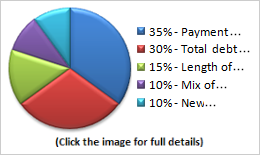Home > How to Avoid Bad Credit > How You Handle Debt Affects Your Credit Score
How You Handle Debt Affects Your Credit Score
Posted on February 3, 2011
Credit and debt are very closely related. How you handle your debt can either help or hurt your credit score. On your credit repair journey, it’s important to be aware of what you’re doing with your debt.
Too Much Debt Hurts
A large part of your credit score – 30% – is based on how much debt you’re carrying on your credit cards. If you have a lot of debt compared to your credit limit, then your credit score will be hurt. However, carrying low balances will help improve your credit score and make you a more desirable borrower. Make paying off debt part of your credit repair plan.
Paying Late is Deadly
One of the reasons to keep your debt low is that it keeps your payments at a manageable level. Once your payments get too high, you’ll have trouble keeping up and you may have to miss a month. Late payments will kill your credit score.
It’s not ok to make a late payment just because your credit score is already bad. Doing that will just lengthen the amount of time it takes your credit to recover. Those old late payments will hurt your credit score less as time goes on, but any recent late payments will have to age before the damage lessens.
Debt Management Solutions Can Affect You, Too
If you’re considering a debt relief company to get rid of your debt, it’s important to know whether using that company’s service will affect your credit score.
Credit counseling, where you pay your debts over a three to five year period, goes on your credit report, but isn’t factored into your credit score. You’ll have to keep up with all your payments to continue building your credit score.
Debt consolidation involves paying off your debt with a debt consolidation loan. Your credit score could be affected if you consolidate your debts using a credit card balance transfer. Your credit score could also be hurt if you’re late on any payments with your debt consolidation loan.
Debt settlement is a strategy in which you pay 40% to 60% of your balances for full satisfaction of your debts. However, debt settlement success requires you to make your creditor uncertain about whether you can pay off your debts. This means getting behind on your credit card payments. If you’re already behind on your credit cards when you start the debt settlement program, you may not suffer much damage. However, if your accounts are current when you start the settlement process, your credit scores have a long way to fall.
Bankruptcy is a court process that eliminates your responsibility for your debts. Bankruptcy can typically get rid of most of your unsecured debts, but secured debts will remain. Bankruptcy is notorious for the damage that’s caused to your credit score and the length of time (10 years) it remains on your credit report.
Choose Carefully
If you have debt, you can’t ignore it. That will just make your credit worse. But, you may have to put your credit repair on hold until after you pay off your debt. Then, you can rebuild your credit without having to deal with overwhelming debt at the same time.
Similar Posts:
- How to Repair Your Credit After Debt Settlement
- How to Organize Your Debt Payments
- How to Know If Bankruptcy is Right? Types and Consequences
- Why You Shouldn’t Let Old Accounts Fall Off Credit Reports
- Dispelling a Credit Myth: Medical Bills Can Hurt Credit







Let's connect!